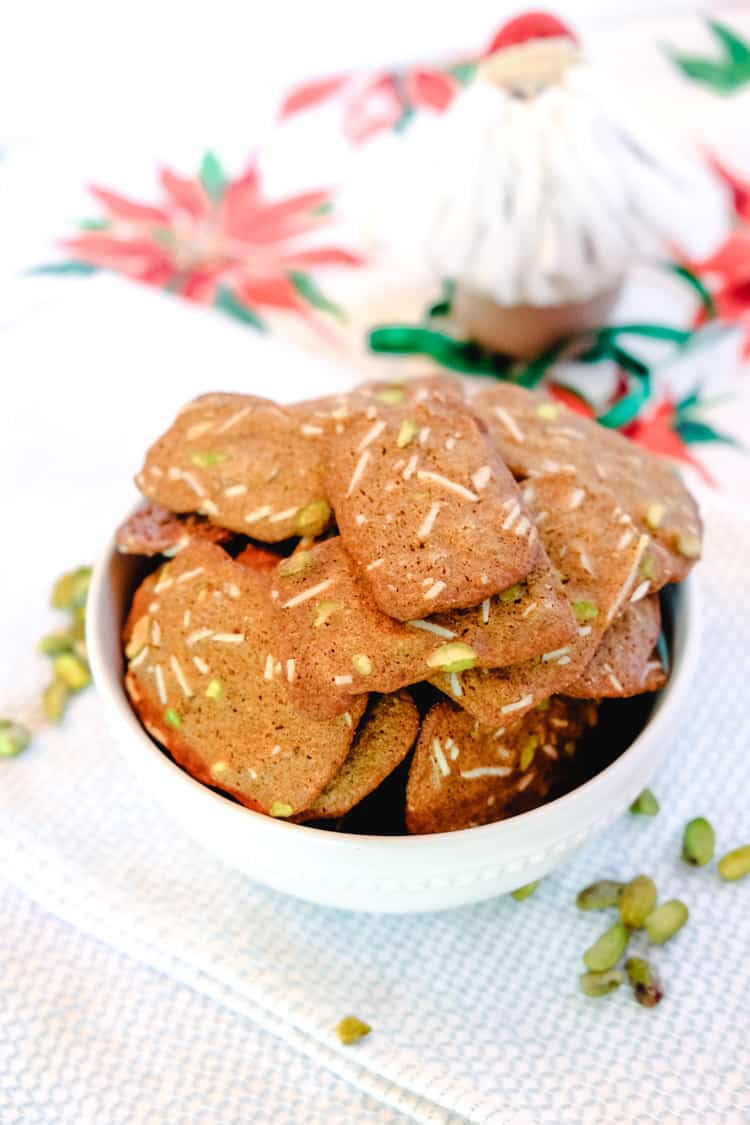Ultimate Guide To Turkish Restaurant Breakfast
This article may contain affiliate links. See our disclosure link for more information.
Turkish breakfast, also known as serpme kahvalti is an important part of Turkish culture. Typically consisting of an array of small plates filled with fresh and unique flavors, it’s a delicious way to make the start of your day a special one.
The restaurant breakfast we enjoyed during our 5 weeks in Istanbul was a highlight of our stay. We still reminisce about it!
Whether you’re planning to enjoy a traditional breakfast at a Turkish restaurant, planning a indulge while in Türkiye, or would like to prepare one at home, Turkish breakfast is definitely worth trying for anyone looking to try great food and new culinary experiences.
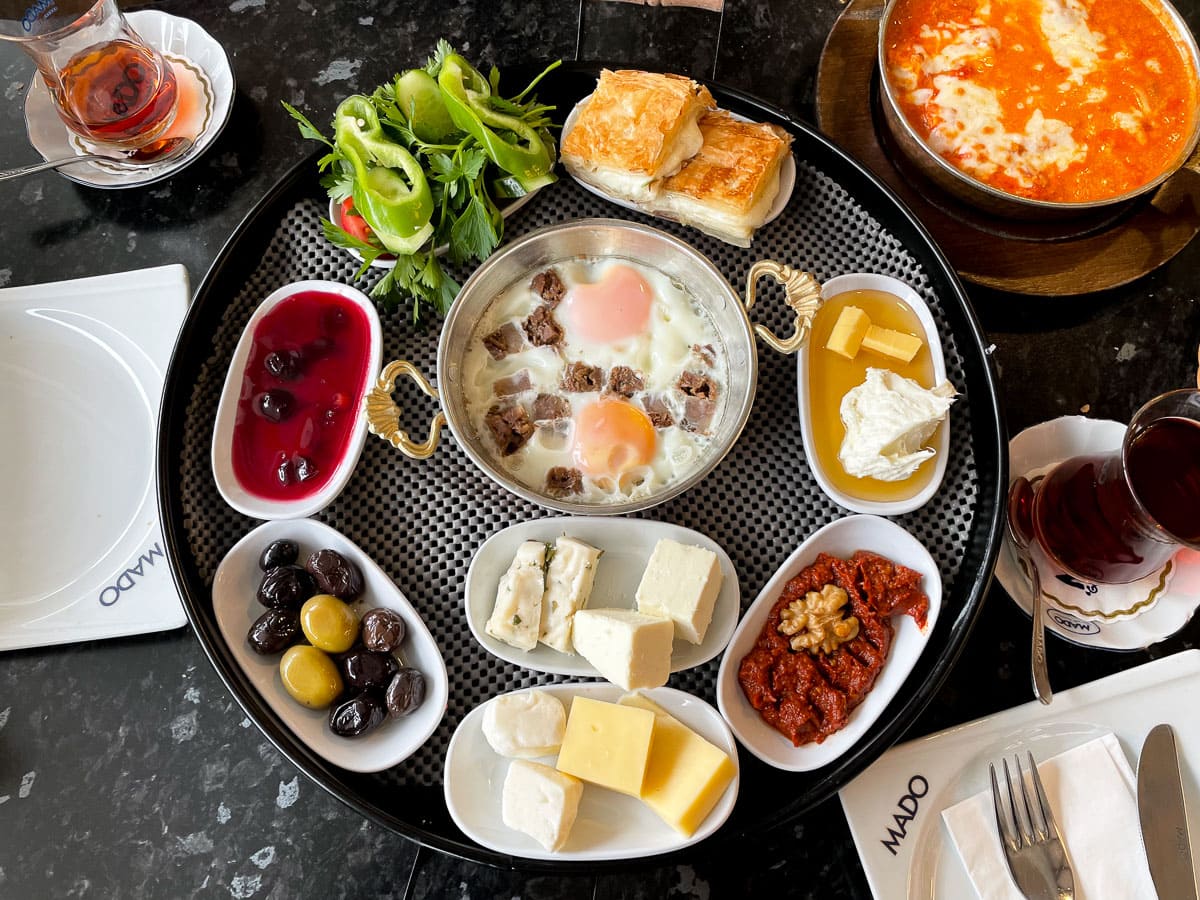
Contents
What’s In A Typical Turkish Breakfast?
The traditional Turkish breakfast is like a feast made up of a rich variety of delicious dishes and drinks. A typical breakfast spread has everything from freshly-baked bread, eggs, local cheeses, cured meats, soup, jams, salads, and more. It’s served family style with everyone serving themselves from the tray.
There’s a lot of preparation and thought that goes behind preparing all the delicious food. The process of brewing the tea or coffee and setting the breakfast table with all the different small plates is also full of tradition and rituals. Whenever there’s a special occasion or holiday, then there might even be more food or special dishes added to the spread.
As you can tell, a typical Turkish breakfast is quite different from US American breakfasts that usually include sweeter options like waffles, pancakes or cereals. Turkish breakfast, on the other hand, is for the most part made of savory food. And because it’s also made up of small amounts of food, Turkish breakfast also tends to be a bit lighter.
What Does A Turkish Breakfast Consist Of?
Each person, household or restaurant may have their own special items or family recipes. Regional variations are also another thing to take into consideration, as they may incorporate a different dish or highlight certain ingredients over others. But for the most part, a basic breakfast is made up of the following different elements.
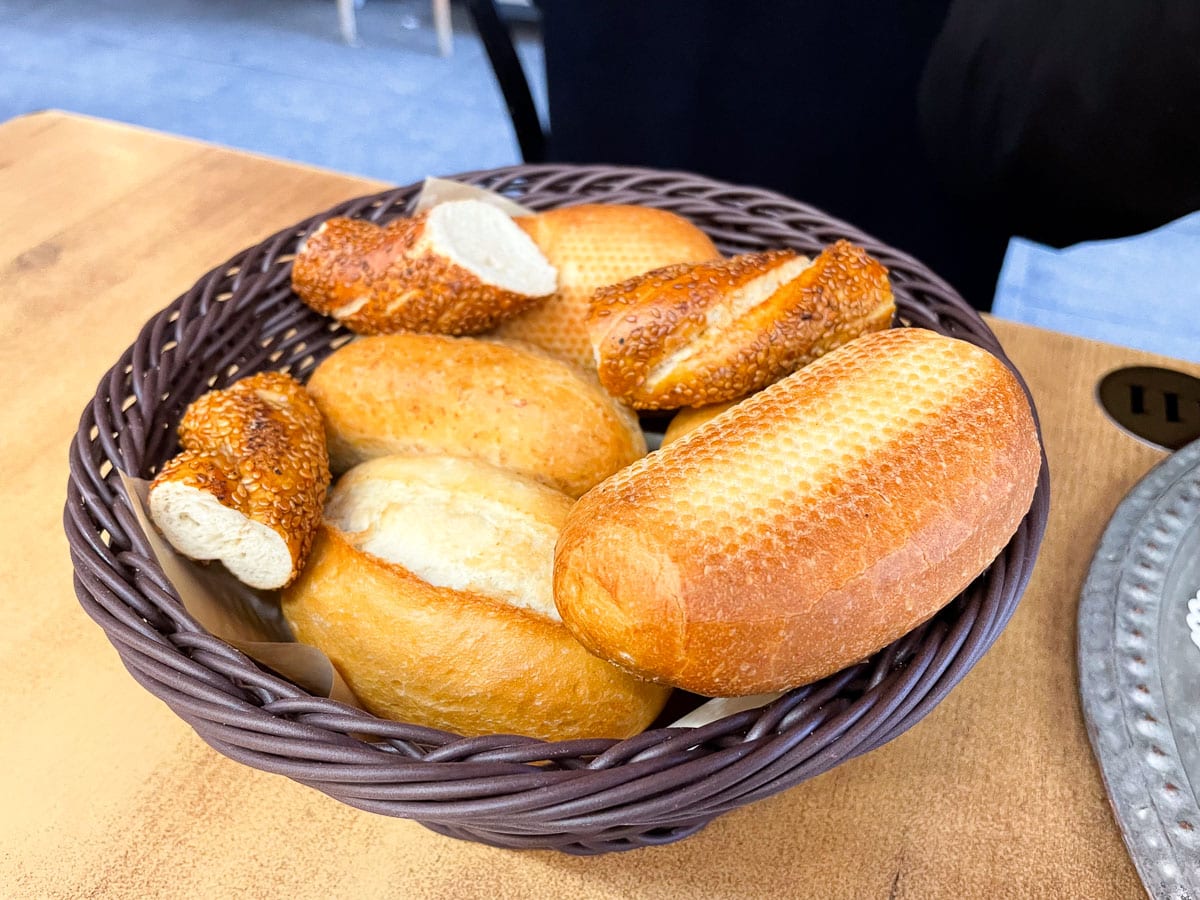
Bread
A delicious range of fresh pieces of bread is a main feature. In addition to rolls or slices of white or wheat bread, one of the most common types of bread served is called simit. It’s similar to a bagel, shaped like a ring and covered in sesame seeds.
It’s always best to have fresh-baked bread and this one is very easy to find at local bakeries in Turkey. We got ours from a small bakery near our apartment but we saw stands all over Istanbul selling plain and filled simit to go.
To enjoy this bread, you typically tear it into smaller pieces and top it with anything from cheese, jam, Nutella or cured meat. It’s also the ideal way to enjoy a quick breakfast on the go.
Another popular type of bread is called pide. This is a type of flatbread that is often used in what’s often referred to as Turkish flatbread pizza, since it usually comes with a variety of toppings and stuffings like cheese, meat, and vegetables. But there is also a plain version.
There’s also bazlama which is a circular, thick and fluffy flatbread that is quite similar to naan. All of these types of bread are ideal for dipping, stuffing or topping – which makes it ideal for Turkish breakfast and all its different dishes.
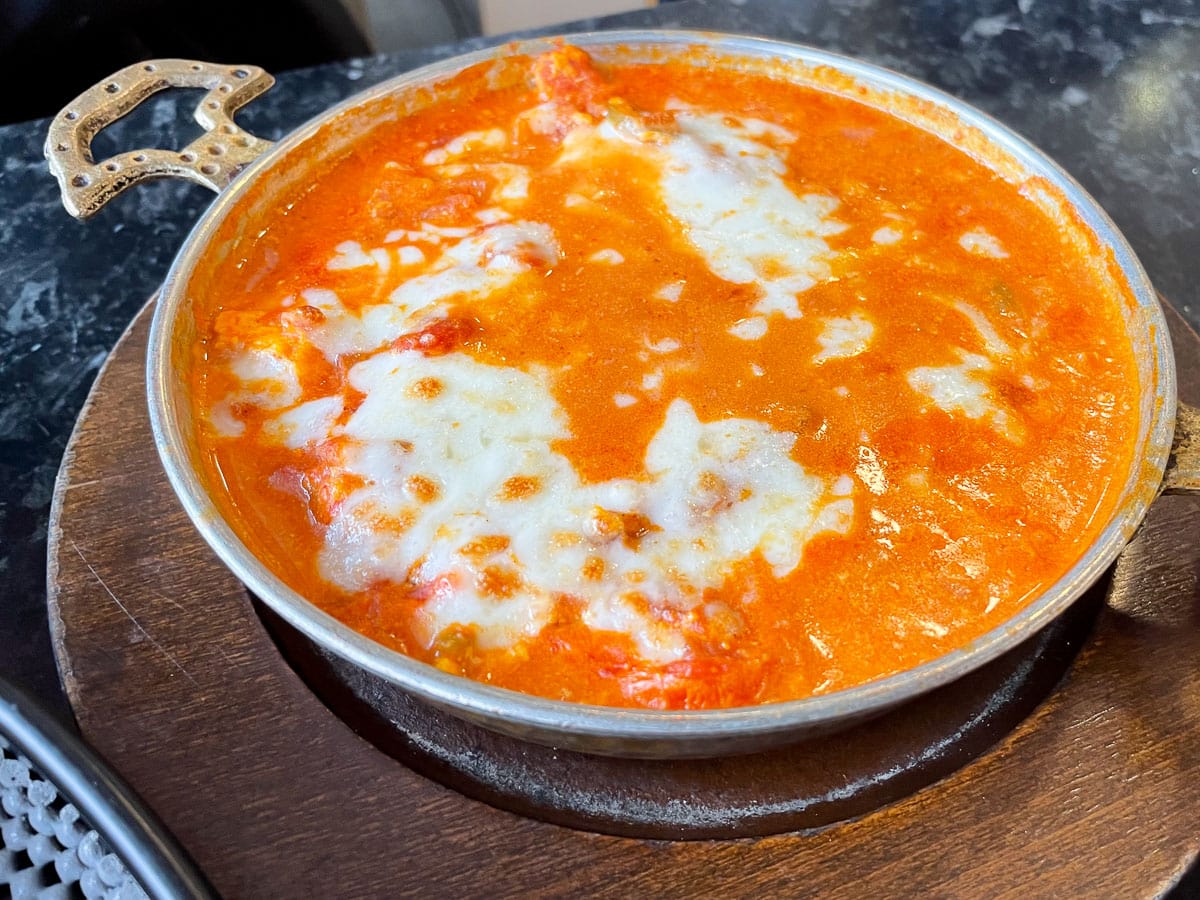
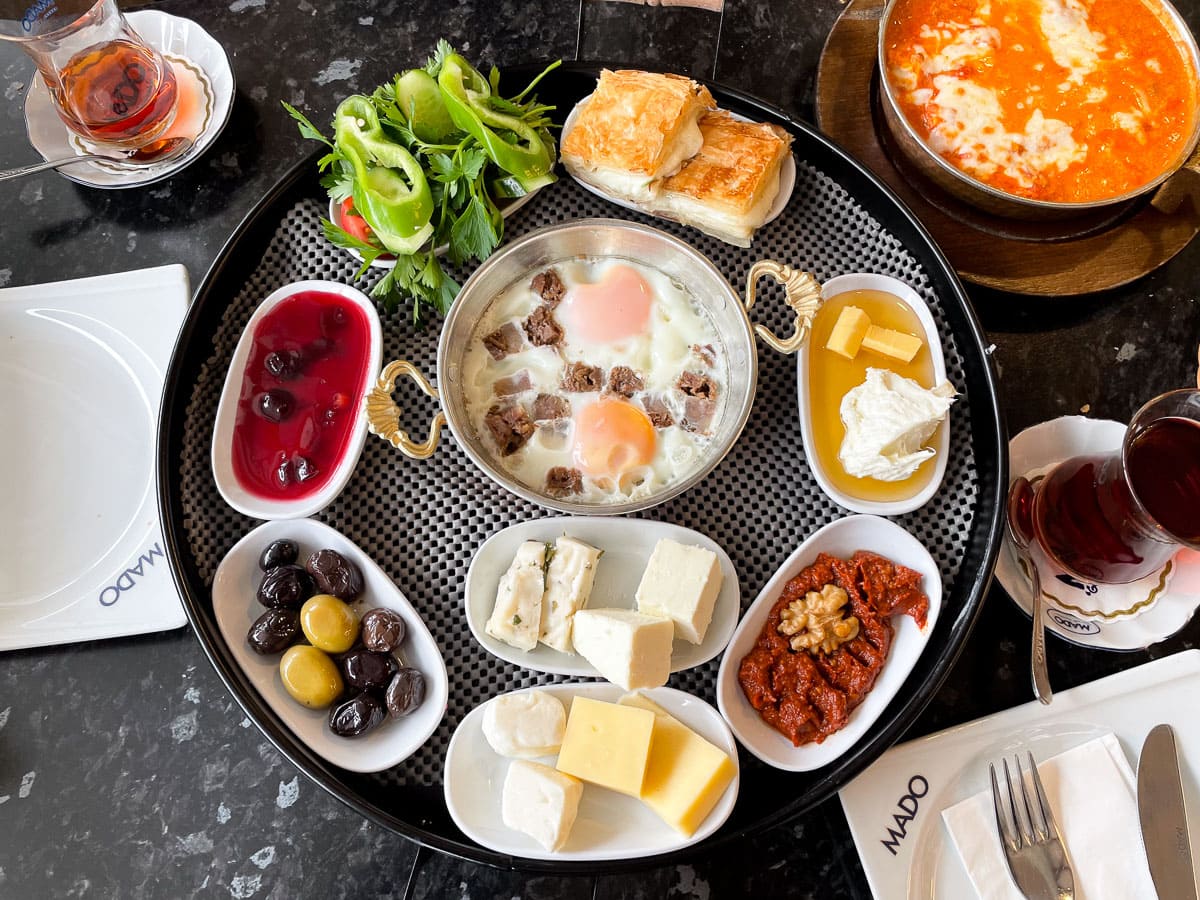
Turkish Breakfast Eggs
Another must-have element are eggs. There are actually a variety of egg dishes you can choose from. One of the most popular breakfast foods is called sucuklu yumurta. Sucuklu yumurta is made of fried eggs and sucuk, a dry, spicy sausage typically made of ground beef or lamb. The egg yolks are usually runny so it’s perfect for dipping simit into it.
Another common egg dish is called menemen. This hearty dish is made up of scrambled eggs with green peppers, tomato sauce, and onions. It’s seasoned with salt, pepper, and various spices. It’s usually served in a skillet or metal pan to also be accompanied with bread. There are many different versions of menemen. Some can include garlic, cheese, spinach, and other vegetables. We ordered this in addition to our family-style Turkish breakfast and loved it.
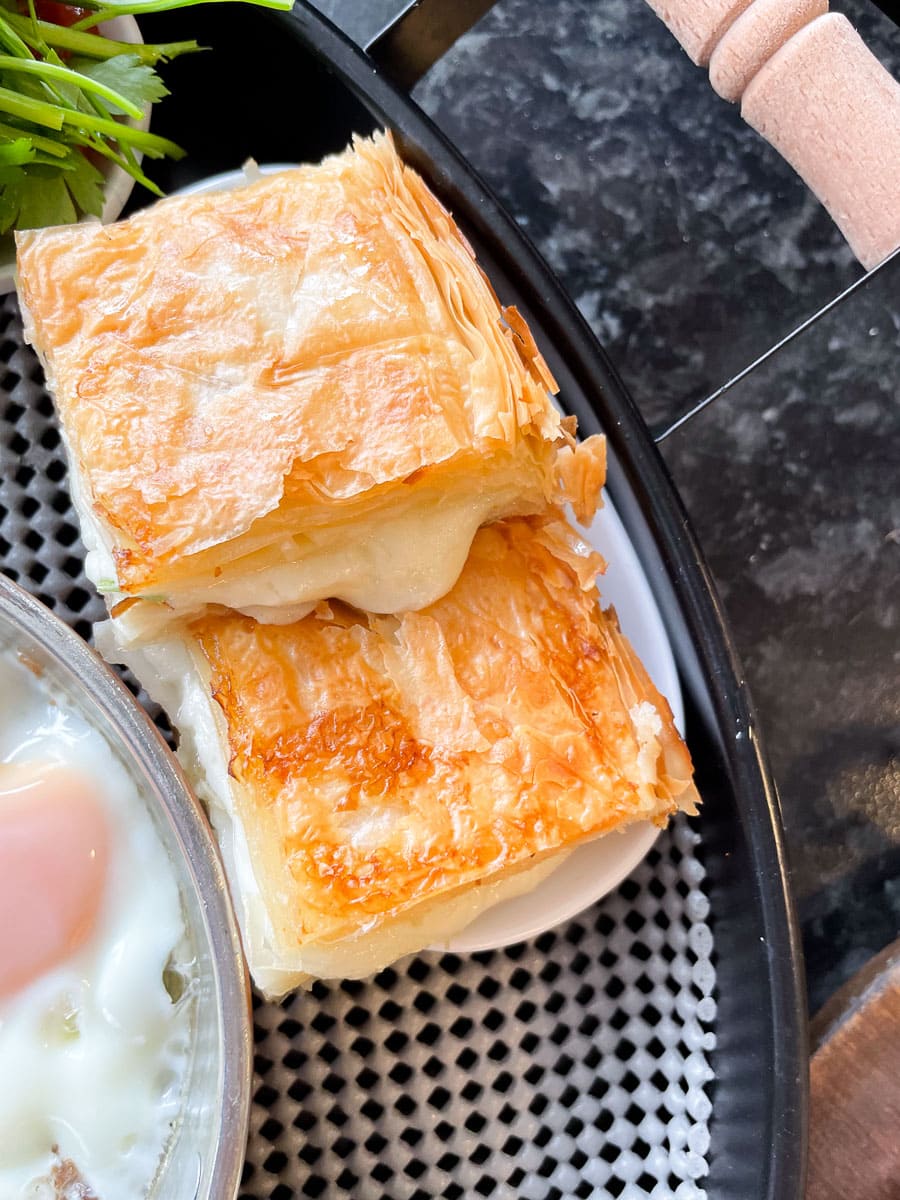
Borek
Borek is a savory pastry made with thin layers of dough called yufka. It can have all sorts of fillings like a mixture of cheeses, meats, potatoes, or spinach. It’s usually baked or fried and then cut depending on its filling or cooking method.
It can be sliced, rolled, or even shaped as a triangle. There are tons of different regional variations, all of which are delicious. Although borek is a popular breakfast item, many people also enjoy it as a snack at any time of the day. You can find it at many bakeries. In addition to being part of our restaurant breakfast, we also picked up pieces of borek for lunch or afternoon snack while out and about.
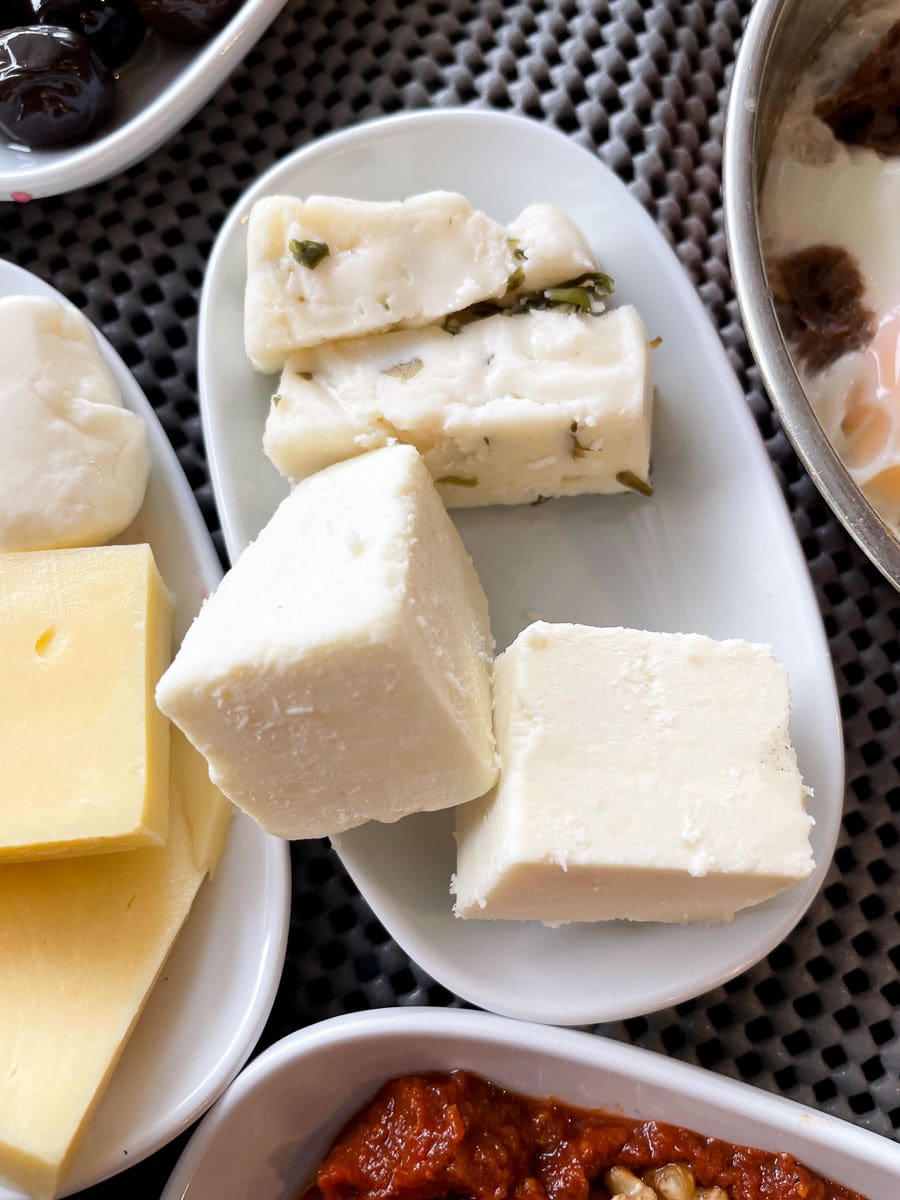
Cheese
A Turkish breakfast isn’t complete without a platter of different types of cheese. The most typical Turkish cheeses include beyaz peynir, a white cheese usually made of cow’s milk, and kasar or kasseri, a semi-hard yellow cheese made from unpasteurized sheep’s milk.
There’s also lor, which is similar to cottage cheese and commonly used as a filling for borek, and tulum cheese, a crumbly, semi-hard cheese made of goat’s milk with a strong flavor.
Other fresh cheeses that aren’t necessarily Turkish may also be part like feta cheese, a crumbly cheese made from sheep’s milk or a mixture of sheep and goat’s milk.
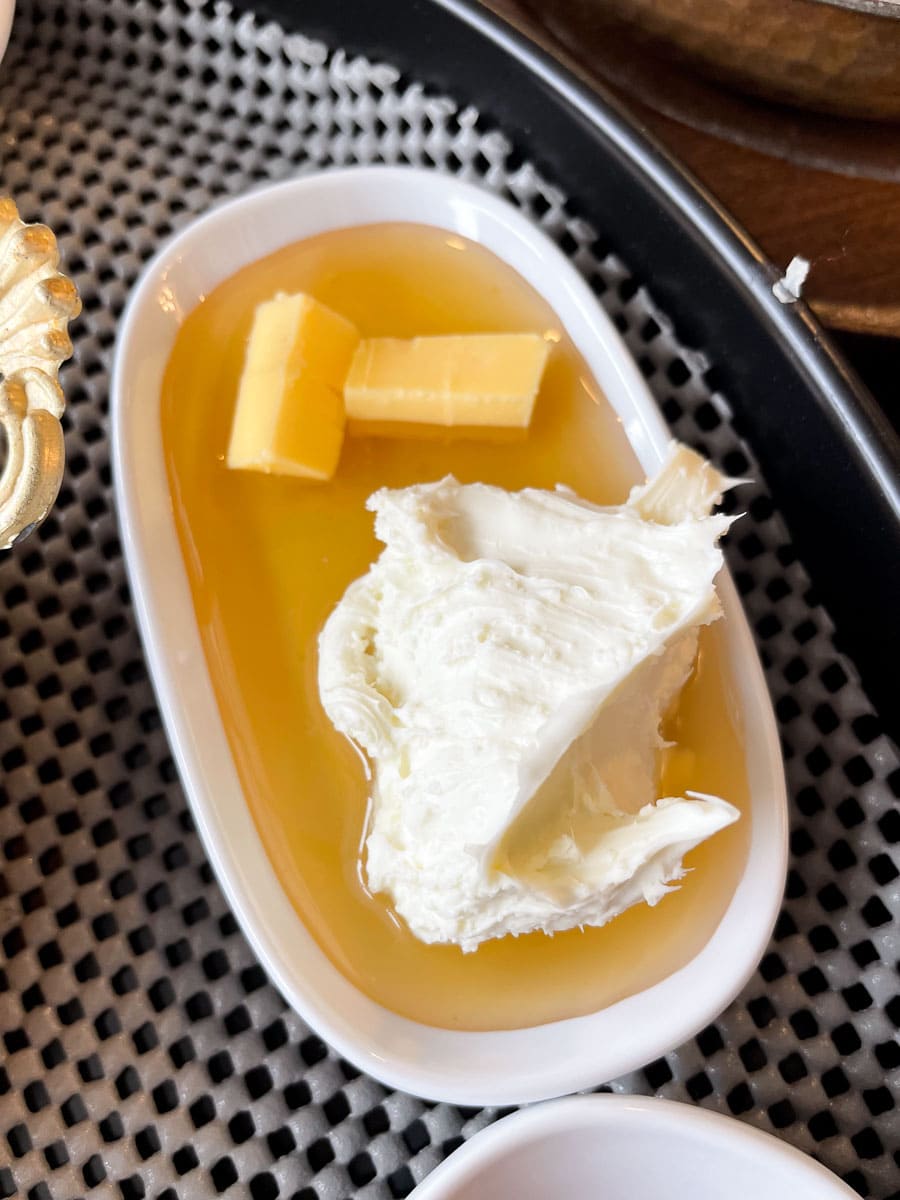
Bal Kaymak
Bal kaymak is a traditional dairy product, quite similar to clotted cream. You spread it on brea and, drizzle honey on top. So good! You can also add fruits or chopped nuts.
The combination of the rich, creamy texture with the sweetness of the honey makes it a delicious spread or dip for your bread.
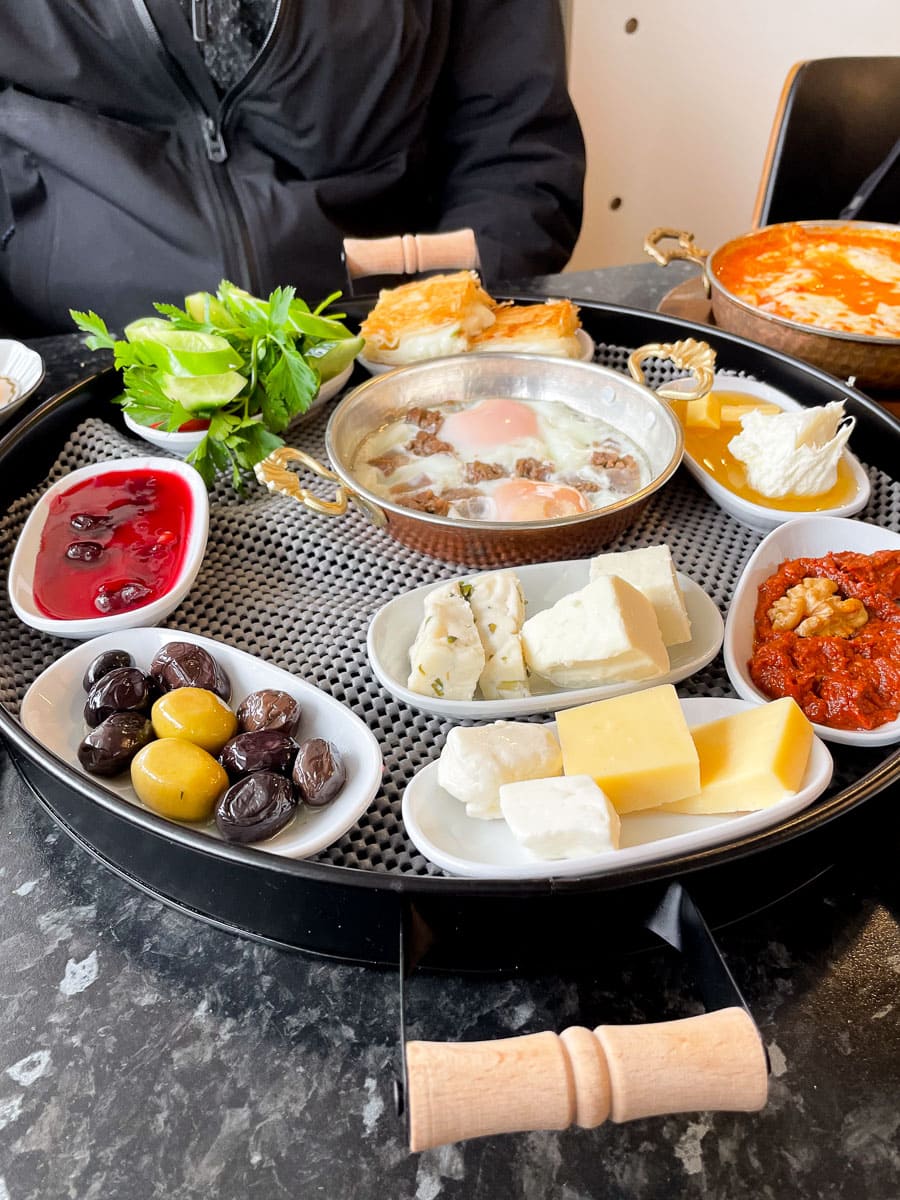
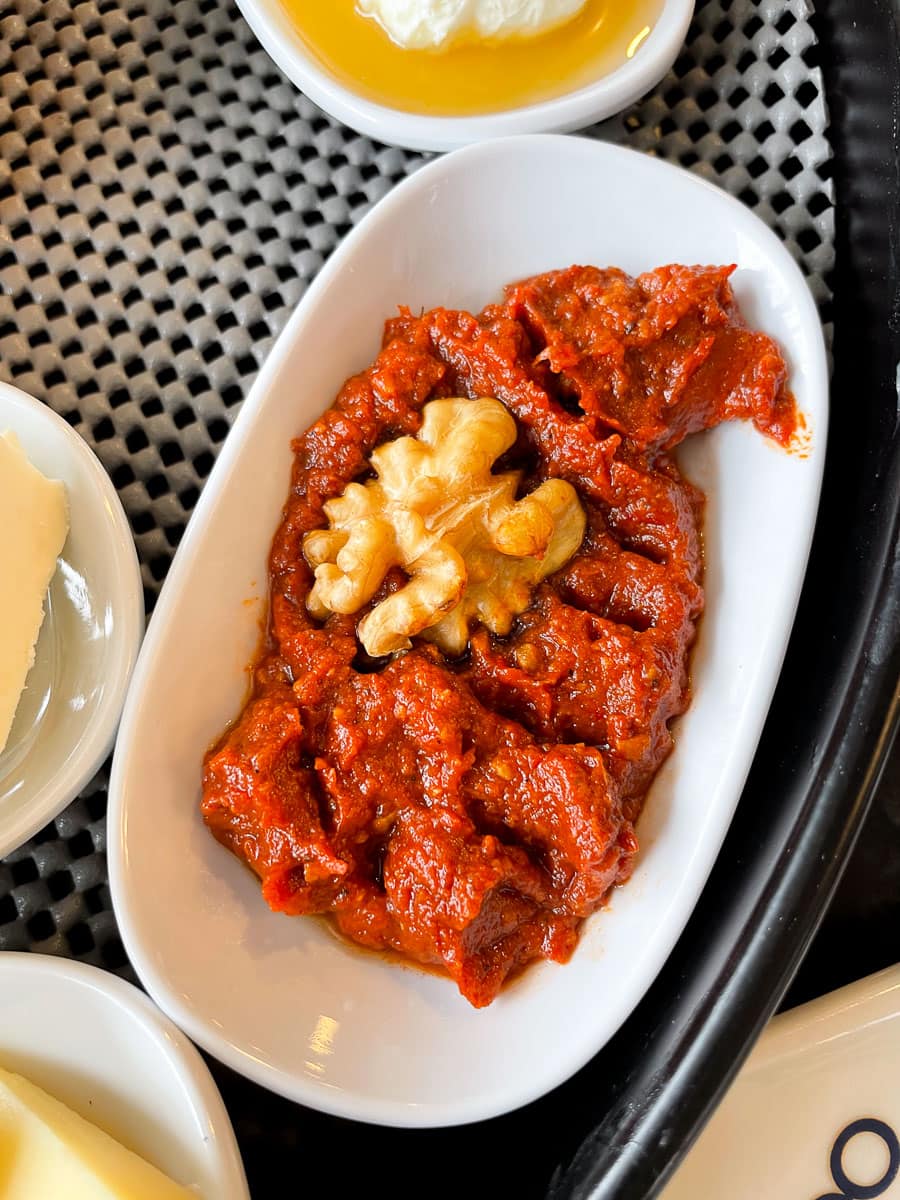
Jams And Spreads
There’s always a selection of jams and spreads at a Turkish breakfast. These can either be sweet or savory. The sweet ones are usually made of fruit preserves, like apricot, cherry, or fig.
Other sweet options are pekmez (grape molasses) and hazelnut spread. For savory spreads, olive spread or tapenade are quite common, as is a spread made from red peppers. These savory spreads are a nice counterbalance to the sweet jams and honey.
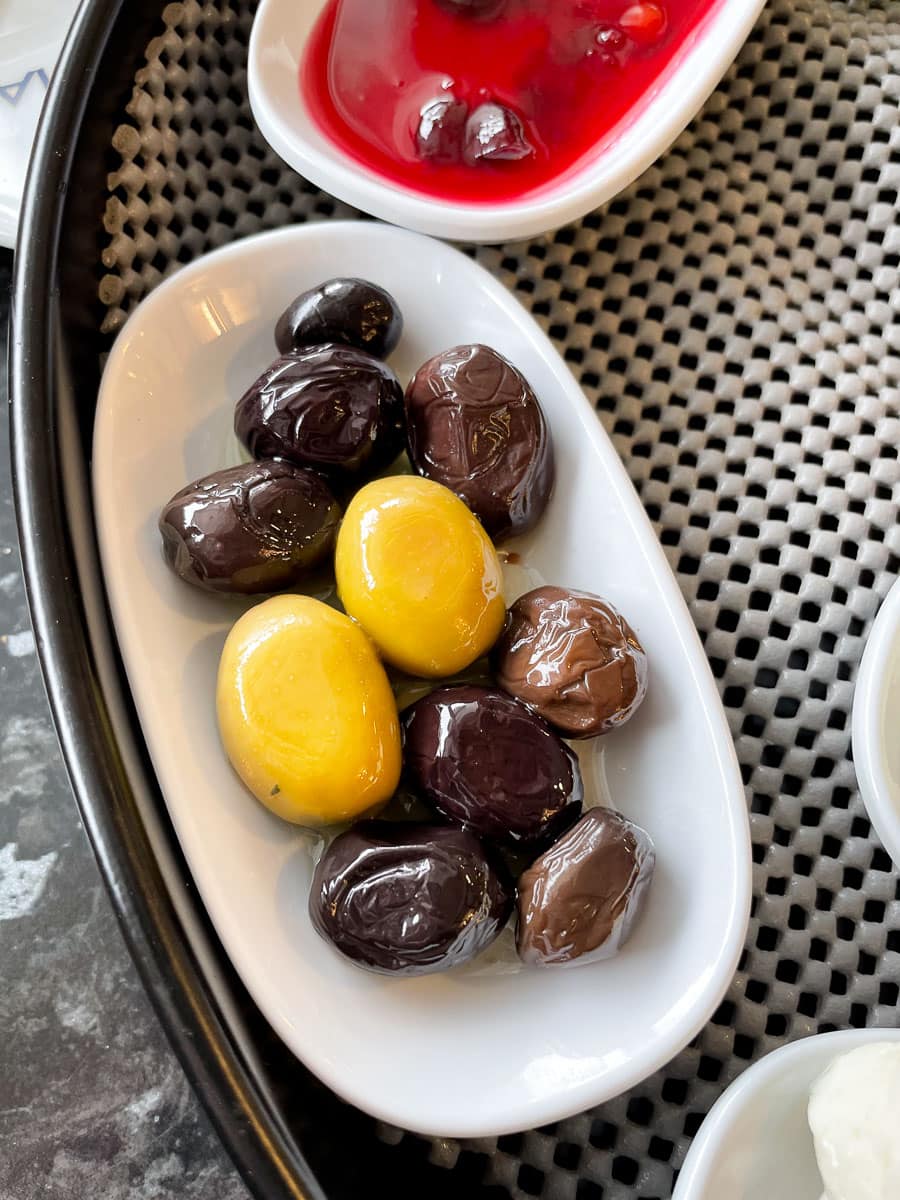
Olives
Olives are one of the main ingredients in Turkish cuisine and breakfast is no exception. As mentioned above, it’s a typical component of savory spreads. Bread is also often enjoyed with olive oil as a dip. But green olive and black olives are also just served on a small dish to be enjoyed on their own.
Lentil soup
Lentil soup is a popular lunch and dinner staple that’s sometimes served during breakfast, especially in restaurants or cafes that serve all-day breakfast. You may not find it in all traditional breakfasts but it also depends on the regional variation. The most common type of lentil soup is made with red lentils, chicken stock, onions, carrots, potatoes and different spices like cumin and paprika.
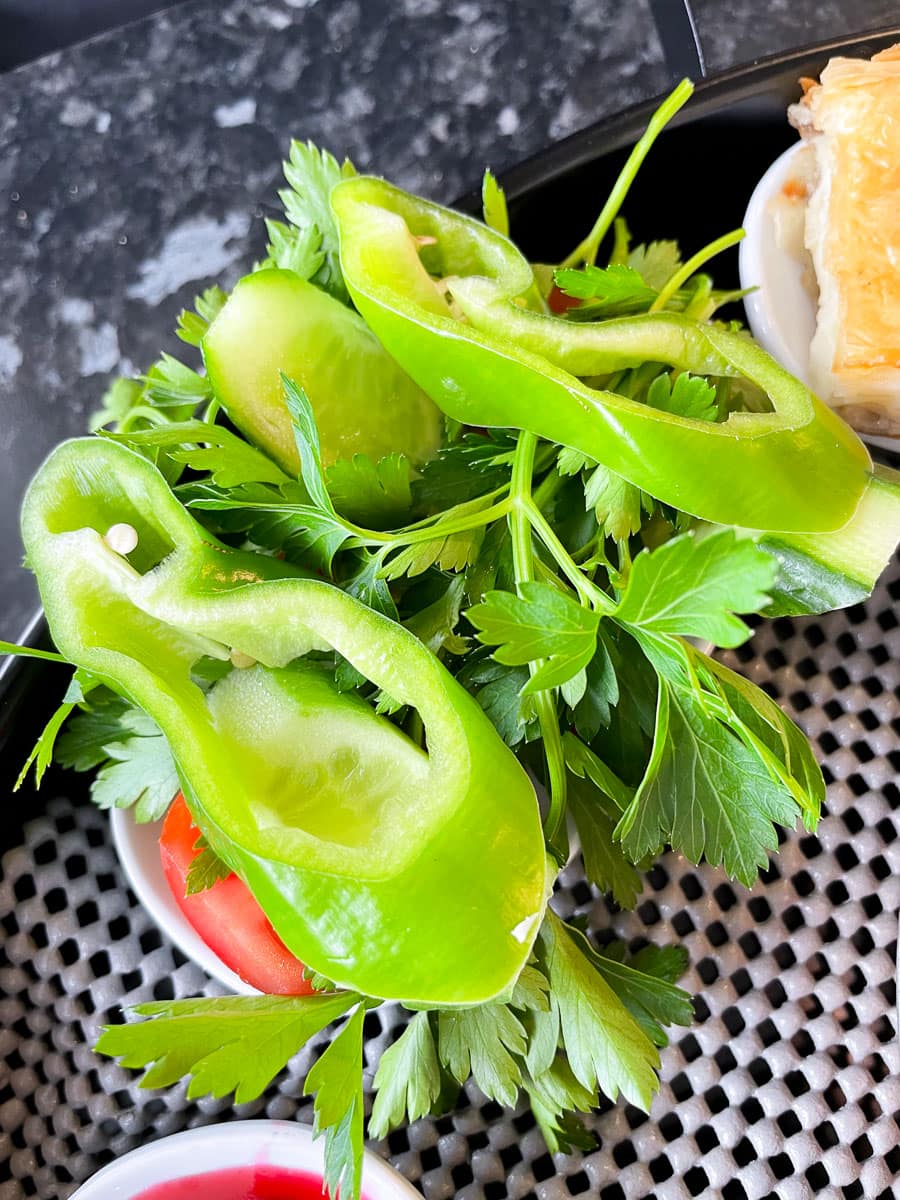
Salad
Fresh vegetables are key in Turkish breakfasts. A side salad with fresh tomatoes, cucumbers, parsley, green peppers or onion, drizzled with olive oil is something you’ll definitely see.
Other salads may include fresh herbs like dill or mint, or more seasonal options like cabbages and radishes. The salad pairs well with everything as it provides a refreshing and light contrast to the heavier items like the cheeses and bread.
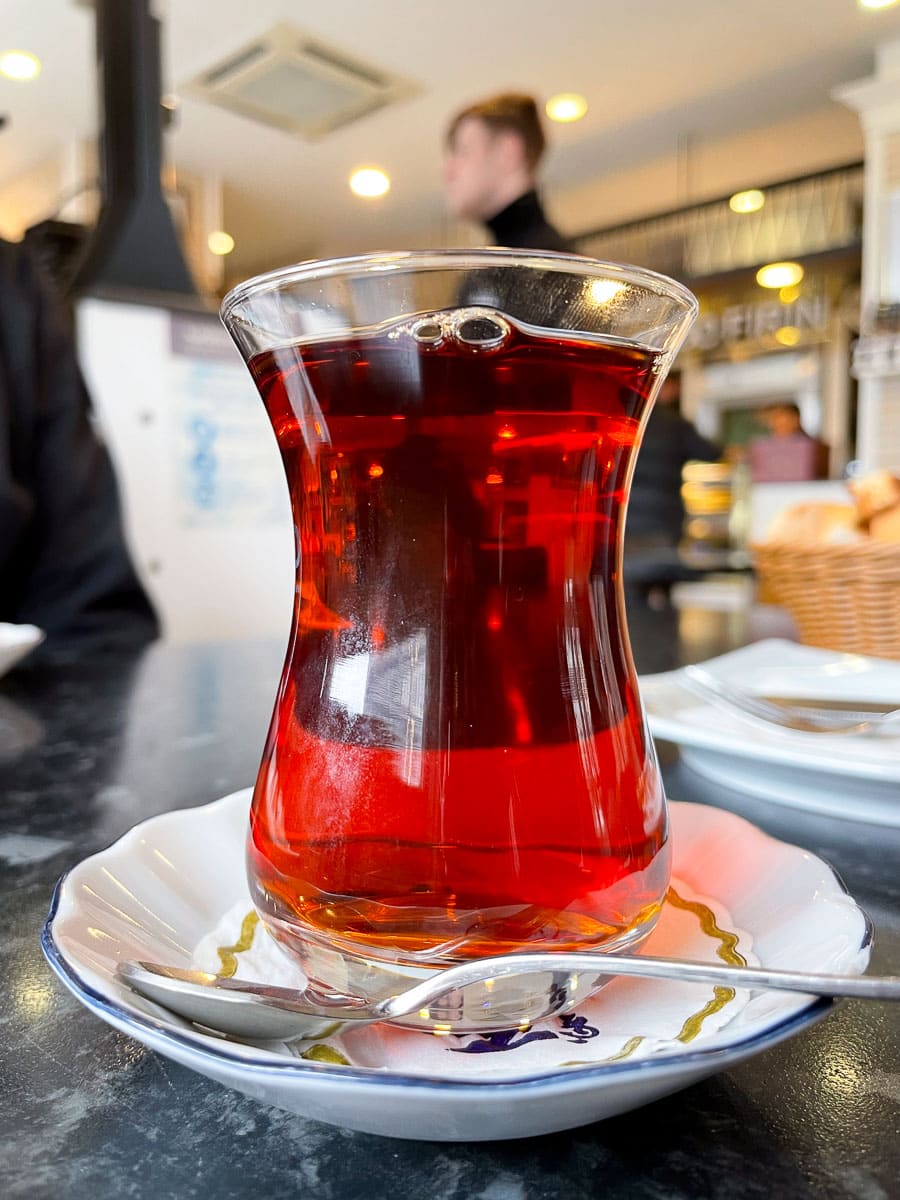
Turkish Tea
The traditional drink for breakfast is Turkish tea. Turkish tea is made using a blend of black tea leaves from Camellia sinensis.
It’s steeped in hot water using a unique brewing process that employs a special dual teapot and is often enjoyed with added sugar. The tea is then served in clear, small tulip-shaped tea glasses. You can opt for other tea blends, but for the most authentic experience, we recommend sticking with black tea.
If you want to make your own Turkish tea at home, check out our recipe here!
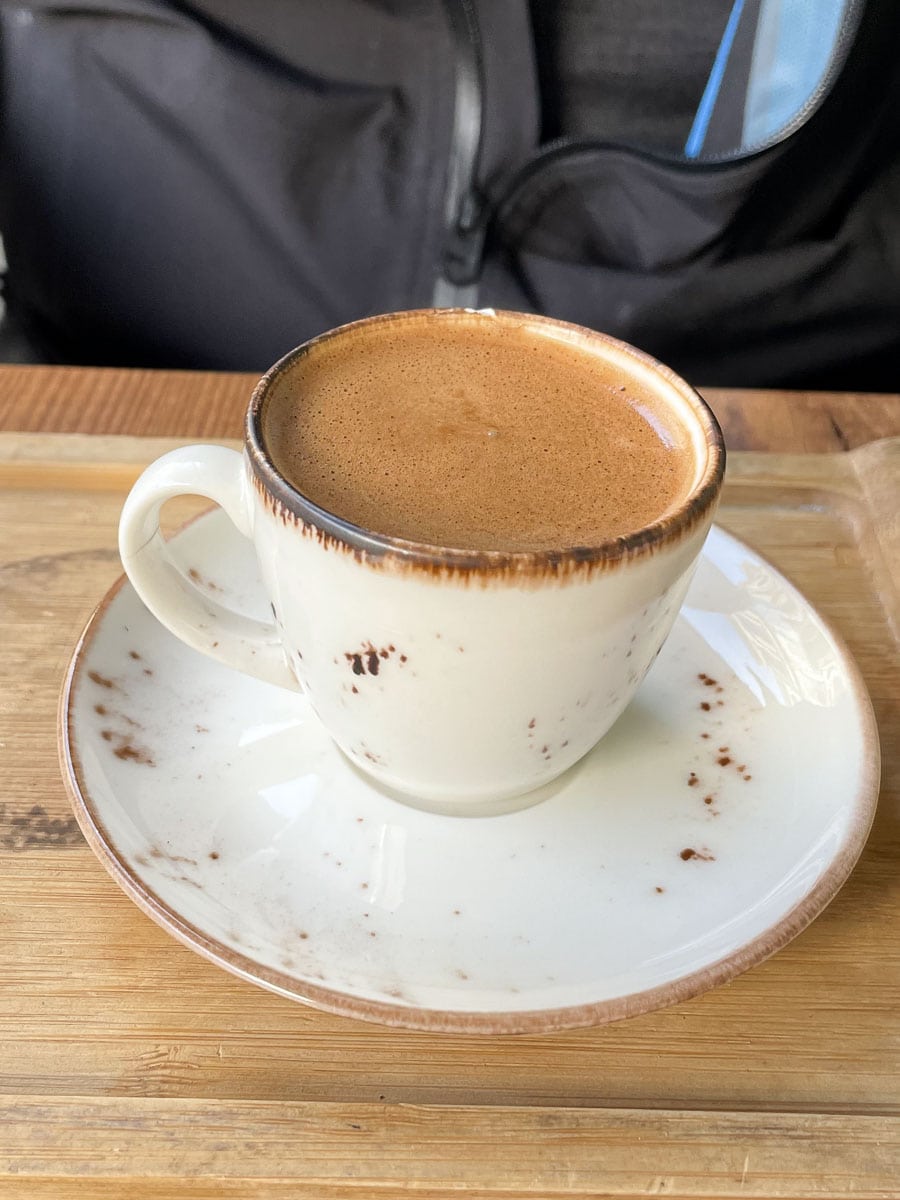
Turkish Coffee
Turkish coffee may or may not actually not served during breakfast but enjoyed after the meal or even later in the afternoon. It’s a unique type of coffee known for its rich, strong taste.
Turkish coffee is usually made with Arabica beans that are roasted to a medium or dark roast. The brewing process is also unique since it’s brewed in special brass or copper pots. It’s traditionally served with a glass of water and a sweet treat on the side, like a Turkish delight or candy.
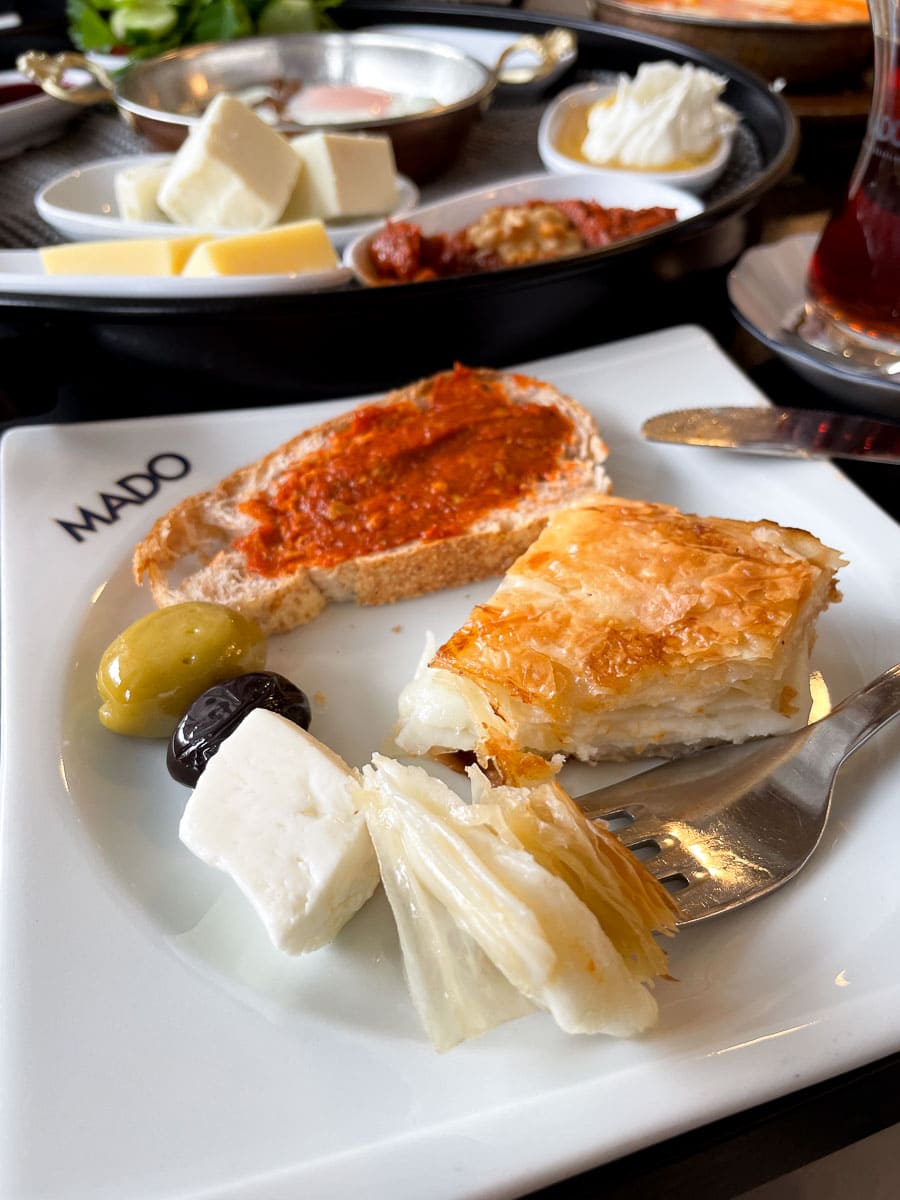
How to Serve Turkish Breakfast
Turkish breakfast is typically served family-style with a variety of bite-sized delicacies arranged on the table for everyone to share.
In restaurants, it is common for the dishes to be brought out on a large round brass or copper tray called a sini. Each dish is served on smaller plates, making it easy to share and try a little bit of everything. This communal style and setup also encourages socializing, which is a big part of the culture behind Turkish breakfast.
It’s common to have a mix of sweet and savory items, as well as warm and cold dishes. You can start with some olives, cheese, and bread, move on to some eggs or borek, and finish with some honey and jam.
There’s no rush to finish everything quickly since it’s all meant to be enjoyed at a leisurely pace, to savor each different dish and enjoy the company of whoever you’re with. Refill your tea and enjoy!
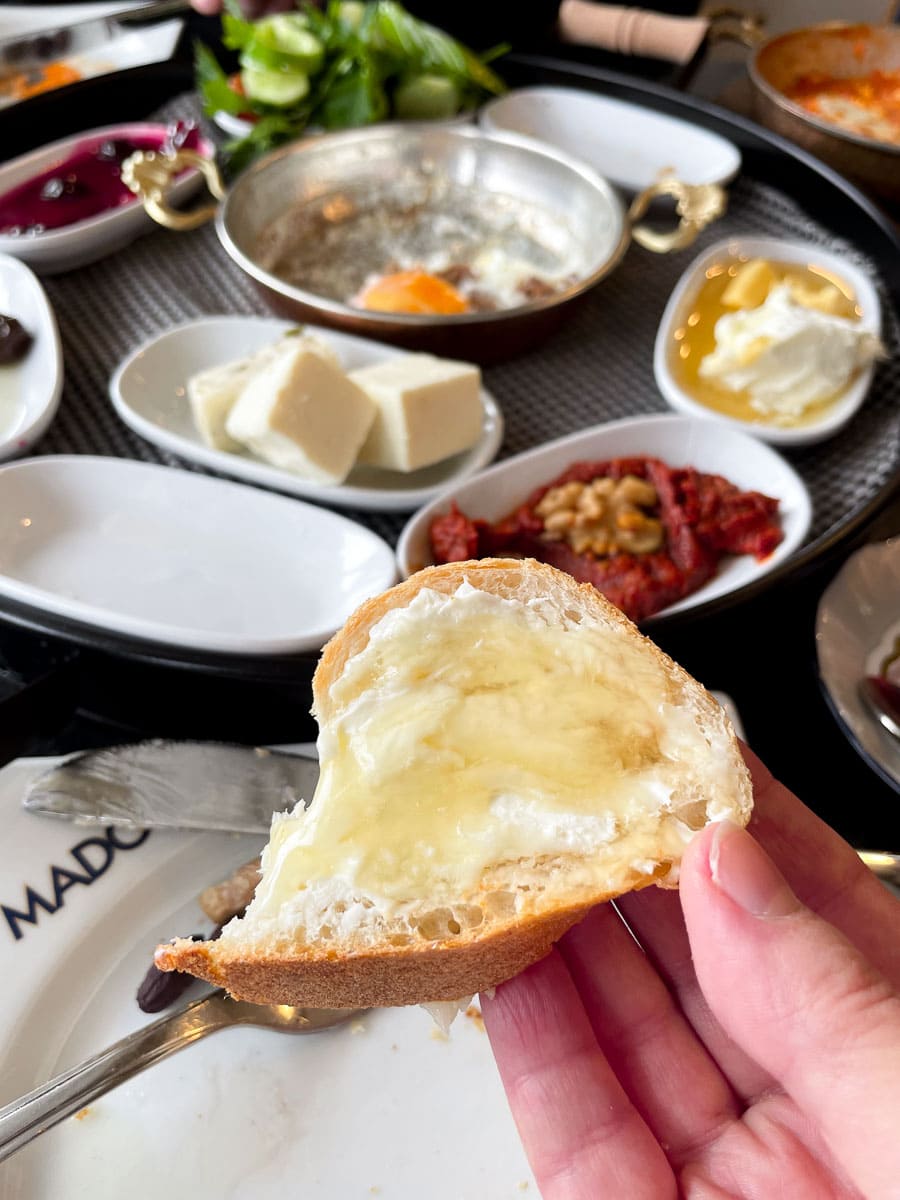
What’s Special About Turkish Breakfast?
In addition to the food, what makes Turkish breakfast so special is the emphasis on sharing and enjoying the meal with family and friends, making it a communal and social affair.
Like many around the world, Turkish people consider breakfast to be the most important meal of the day. It’s usually preferred to be enjoyed with many members of the family present. This is especially true on the weekends, when there’s not much of a rush so everyone can take their time to enjoy the food.
Breakfast can also be quite a social affair (much like Sunday brunch) where other family members and friends are invited. Because of this, the meal is often enjoyed over long conversations and can last for several hours. In fact, many restaurants and cafes offer all-day breakfast menus to cater to this tradition. It’s truly a great way to start the day!
In terms of regional variations, most of them all have the same staple dishes at their core. But of course there are still a few regional differences. For example in the Black Sea region, anchovies are a main feature, usually accompanied with the typical breads and cheeses. Another popular dish is called kuymak which is a fondue-like dip made with cornmeal and cheese. In the Aegean region, olives and olive oil are more prominent. Turkish regions also usually have their own filled breakfast pastry or bread, like boyoz (a round, flaky bread similar to a croissant) from the Izmir region or biberli ekmek (red peppers bread) from the Hatay region.
Turkish breakfast can also be more of a social event, where families make time and gather together to enjoy the food at a slower pace. Because of all of these differences and not to mention the delicious food, having a typical Turkish breakfast is a great experience that you must try whether it be in a Turkish restaurant or even preparing one at home!
Is Turkish Breakfast Healthy?
Turkish breakfast can be quite healthy. Many of the dishes like the cheeses, salads and olives are high in nutrients and fibers. You also get a lot of protein with the different egg dishes. Of course, some of the other elements like borek, bread, and honey are higher in calories. But overall, since portions are small and well-balanced, Turkish breakfast can be healthy.
Is Turkish Food Gluten Free?
Since bread is traditionally a big part of the breakfast, you can’t consider it to be gluten free. But if you choose not to eat the breads and pastries, then you can easily enjoy all the other dishes for a gluten-free experience.
Does Turkish Food Have Vegan Options?
Yes, Turkish breakfast can have vegan options. Many of the dishes served in a traditional Turkish breakfast are plant-based, such as the spreads, olives, tomatoes, cucumbers, and various types of bread. However, other breakfast items, like the cheese and egg dishes are not vegan.
Does Turkish Food Have Nuts?
Yes, nuts are commonly served whole or crushed and mixed with honey or jam as a topping for bread or cheese. So in most cases, they’re not essential to the dish and are just an additional topping.
Is Turkish Food Halal?
Turkish breakfast can be halal if it is prepared with halal ingredients and meat. If you’re eating in a restaurant, it’s always best to confirm the halal status of any cheese or other dairy products served and to ensure that the meat used is prepared according to Islamic dietary laws.
Where To Have Turkish Breakfast In Istanbul?
Anywhere! You’ll have an easy time finding cafes and restaurants serving Turkish breakfast in Istanbul since it’s such an important part of Turkish culture. You can also find a wide variety of options, from traditional and authentic versions to more modern interpretations with a twist.

